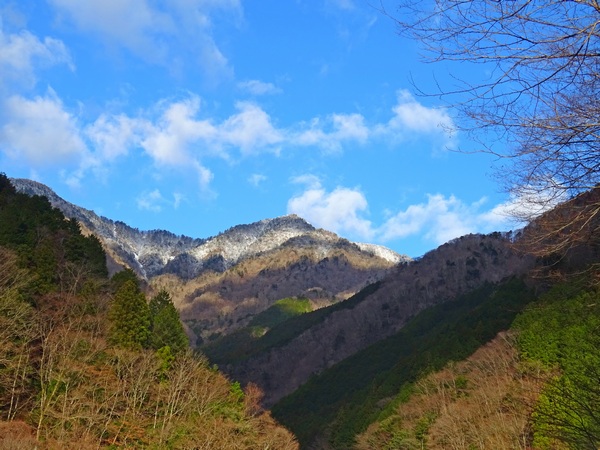
Christmas Day, 2020. Heading for Mt. Yambushi. Suddenly, looking up at the ridge, realizing that there might be snow on the ground–that there is likely snow on the ground, a lot of snow near the top.
Months ago, Typhoon # 19 reeked havoc in the area, and the trail up the mountain has been “closed” ever since. Word of mouth was that both the road going in was impassable (and it’s always been a bumpy, rain-rutted road), and the trail itself had been damaged and scrambling up the mountain was no longer “safe” or “allowed.”
But through social media, we knew that some people were climbing again, and I decided it was about time for me to get back to Yambushi.
In a nutshell, it was six hours of solitude and beauty. The first of those hours, I was trying to remember things I’d felt on this mountain in climbs past. Because it had been a while since I’d been on the mountain.
Up and down, I passed only one other hiker.
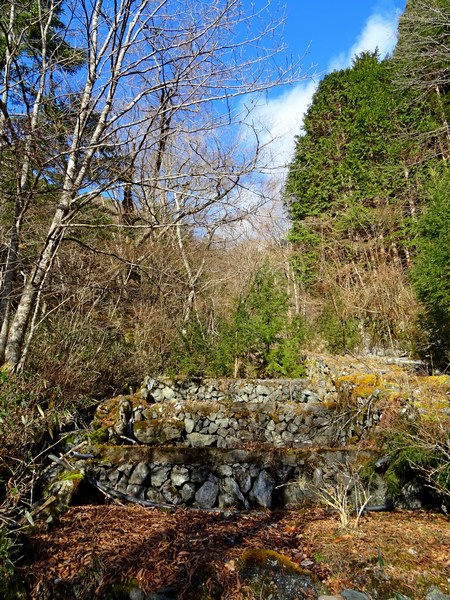
There are things from the past we never knew and probably never will. Things we see traces of—like the above remains of a water field for wasabi. We can only imagine the farmer in that field, only wonder what sort of life the work provided him, only wonder whether the field made him happy or was a source of misery.
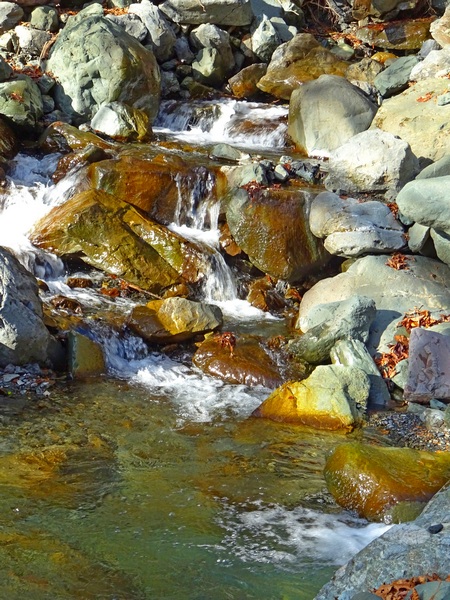
But there are also things from the past that we knew—or suspected we knew—but cannot see clearly now, can only feel vague traces of.
And things we’ve forgotten completely. Things that we’ve let drop from our “stories.” We may not feel anything about them at all—or only feel them in feeling something lacking in our “stories.”
Sometimes we think that we’d like to have all miraculously revealed to us, that we need it to be revealed, so that we can understand the reality of how we got to wherever we are—so that we can know where we are.
Some of what’s lost dates from a time when we at least had the capacity to remember. Some, perhaps, dates from an even earlier time.
If we could only find the trail. If only there were some bridge.
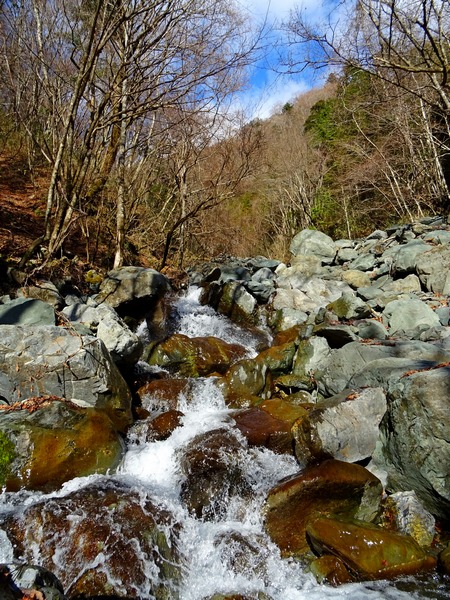
Ah, Yambushi. That’s where we are.
The road to the trailhead is fine. The first stretch of the trail is fine, too.
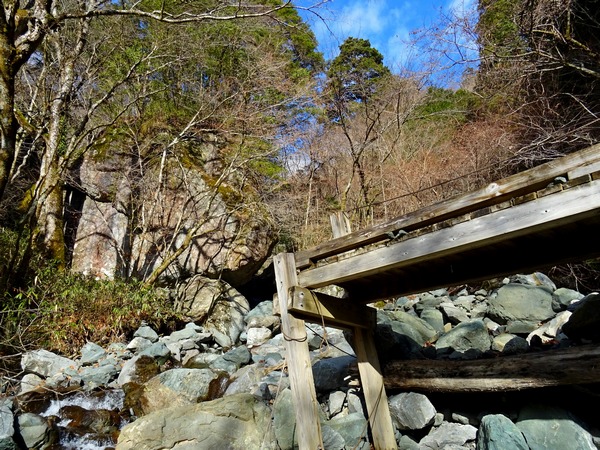
But then we come to the first bridge and half of it is missing. We have a moment of anxiety, we’re thrown out of our rhythm—but then we realize there isn’t much water in the river at this particular point, and we can easily step across the rocks and continue on our way.
The second bridge, too, is only half there. Again, it’s possible to step across the rocks, but it takes a little maneuvering this time, and we can’t help but feel suspicious of the trail to come.
The third bridge has vanished. But since we’re not used to it not being there, we can’t quite remember where it was. Suddenly it’s hard to say whether we’ve passed it and missed our crossover, or we’ve yet to come to it.
A little farther along, the trail seems to dive into the river, and because we’ve forgotten exactly where the third bridge was and because we can see no signs of a broken bridge (yeah, yeah, I know, really it was only ME), it’s easy to look at the loose dirt on the left bank and imagine there’s been a landslide, albeit it a fairly minor one, and the trail’s been buried.
Then all we can do is walk up the river, in the river, over the rocks.
But then we see that the banks are getting steep on both sides and a trail is coming into sight nowhere. And then we don’t know which bank we should try to scramble back up in search of the trail.
We’ve done this hike thirteen, fourteen, fifteen times before.
Twenty minutes later (scrambling up the wrong bank, sliding back down the wrong bank, scrambling up the right bank), we find ourselves back on the familiar trail.
Thankful . . . but our minds still thrown a bit out of kilter.
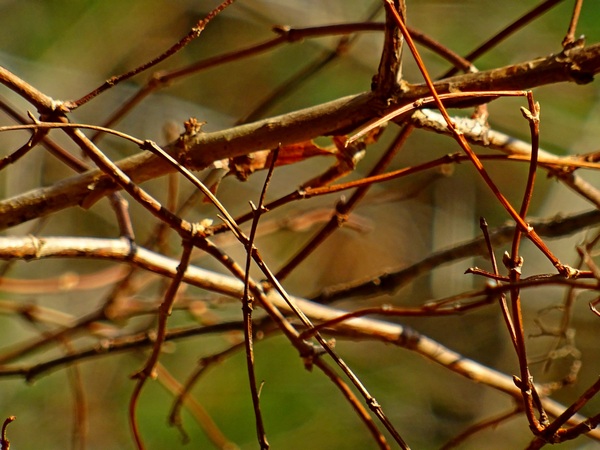
We hear birds somewhere, and look up into the scrambled brown branches, into the patches of grey and green, and do not discover the chickadees we’ve seen among those branches in previous winters.
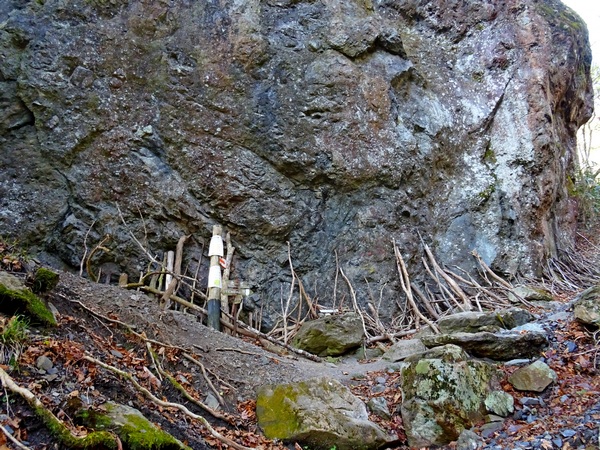
We feel great relief coming to “The Big Rock,” seeing that the sticks that keep the rock from tumbling down into the river are as we remember them.
Sticks left by hikers capable of great faith—for more than a hundred years.
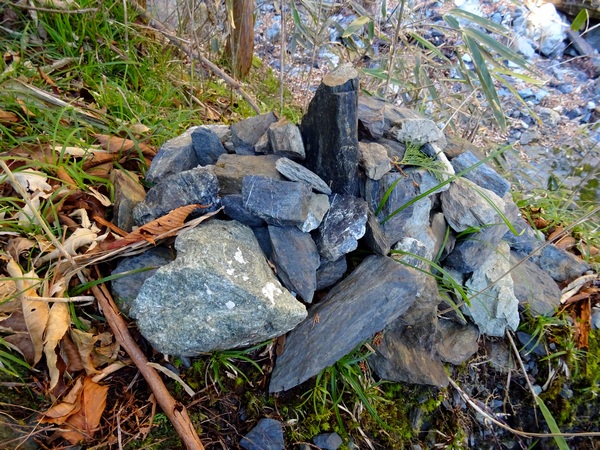
We’re comforted to see the shrines are standing here and there, though we can’t say with any certainty whether they’re the ones we’ve seen before.
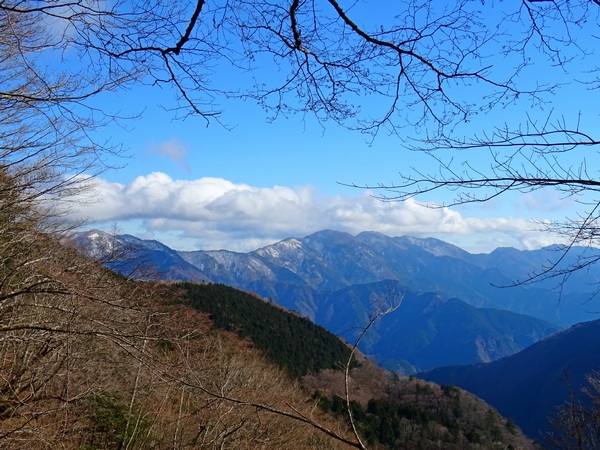
And then the walking is smooth. We enjoy the lovely view from just below the Yomogi Pass.
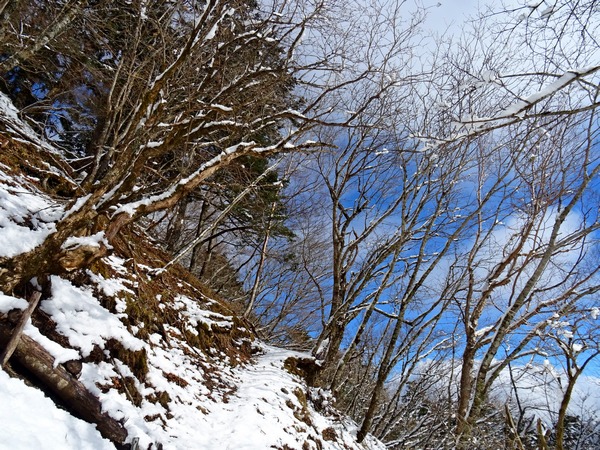
And then we’ve turned up from the pass, we’re approaching 1700 meters in altitude. And we see the snow up ahead. It’s a switchback trail, so the trail itself is not so steep, but the slope is. With the slippery snow painting the trail, it seems more narrow than it does in summertime.
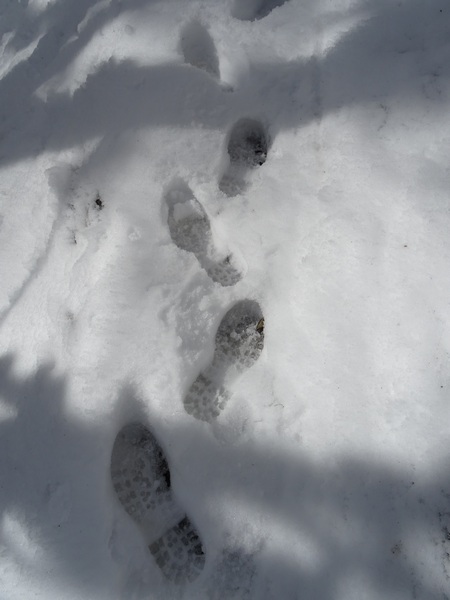
Footprints. You’re grateful for them. You probably won’t get lost. And it’s easy to walk, stepping upon them. At the same time, when you do, your mind drifts from the trail up ahead. On a snowy day, you should be confirming the lay of the land that is before you, as the trail itself, right in front of your feet, is hard to identify. I try to do both, walk in someone else’s shoes and make sure that I see where I’m heading.
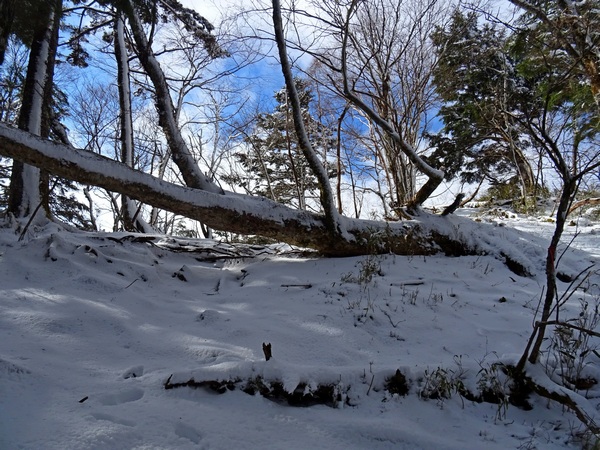
Ah, a clear memory. The “usual” trail passes under the leaning tree on the left. The footprints circle around to the right.
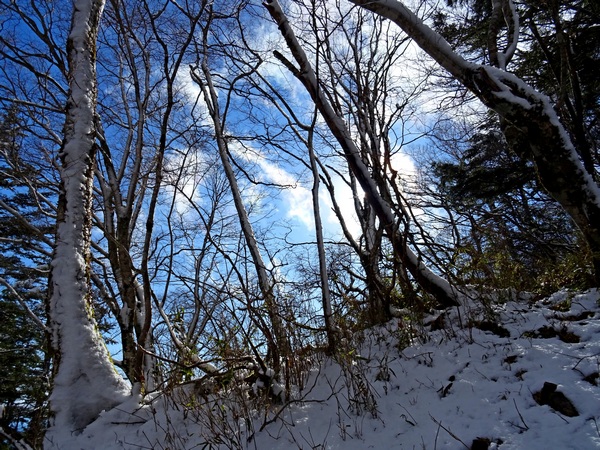
And then something good happens. The sky is blue. The white of the snow and the blue are lovely together. It’s a lovely day. And suddenly you’ve forgotten that you’re trying to remember something. Because you’re in the moment. A beautiful moment.
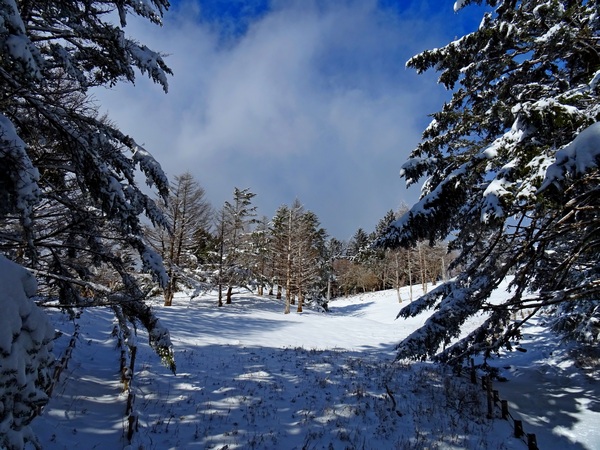
Then you’re near the top, in the moment.
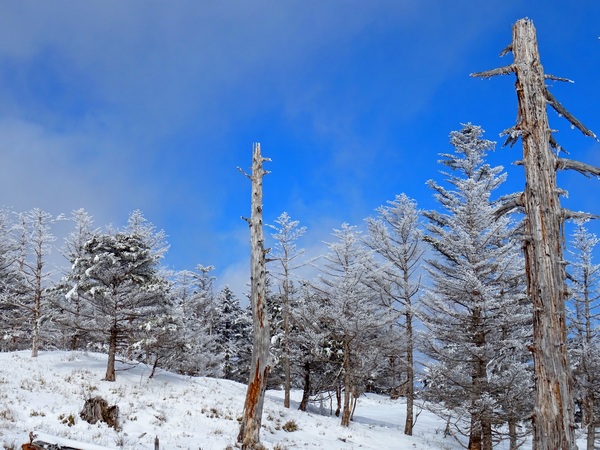
And nearer the top, in the moment.
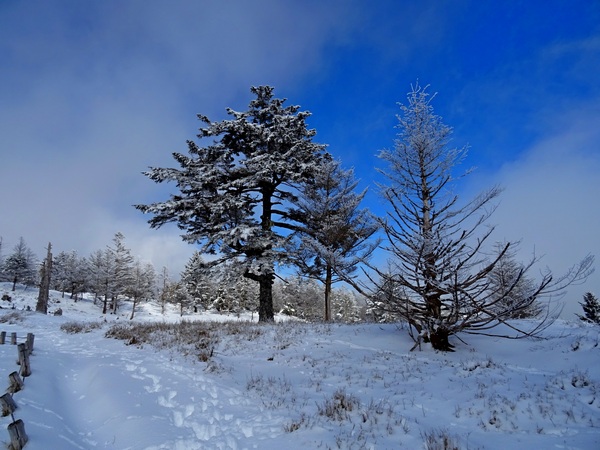
And nearer.
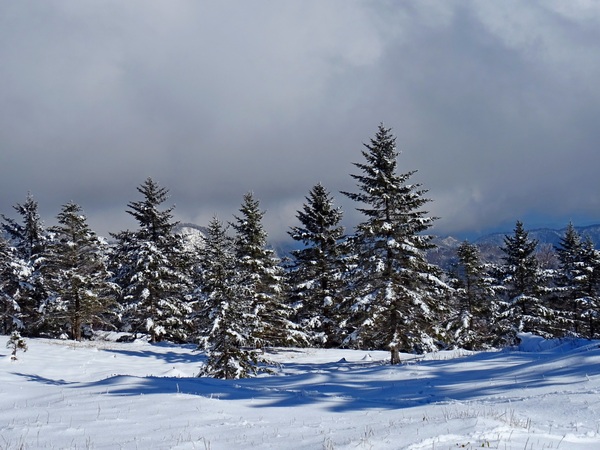
And then you are at the top. Still in the moment.
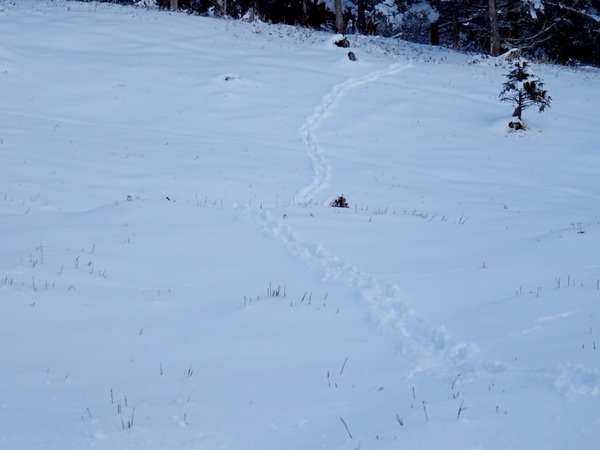
Someone has shuffled off into the woods, hardly hurrying. Unmindful of you. How long ago it’s hard to say.
That’s okay. You’re in the moment. And it really is beautiful.
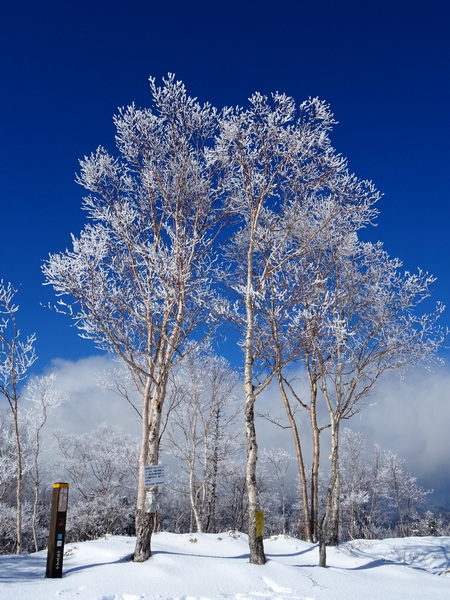
(from Persimmon Dreams: When you’ve got a spare moment, check out our music/nature videos on our “Persimmon Dreams” YouTube channel, or Steve’s books, When a Sissy Climbs a Mountain in May and Along the Same Street, available on Amazon, or directly from us. And if you enjoyed this post, consider sharing with others. Thank you!)